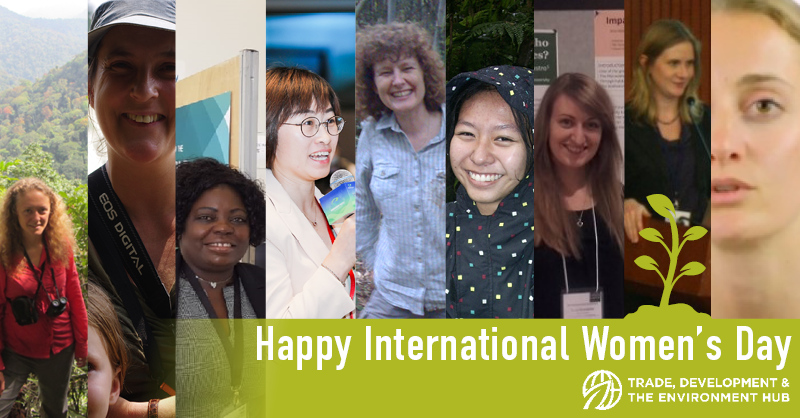According to the UNESCO Institute for Statistics, less than 30% of the world’s researchers are women. Furthermore, studies have found that women are paid less than men, and do not progress as far in their scientific careers. Closing this gender gap is vital, as women’s contribution to scientific progress is invaluable.
The TRADE Hub is fortunate to have amazing women across the planet working every day to make global sustainable trade a reality. Today, we share some of their experiences and insights.
Li Yanxia
Senior Programme Officer of the Global Programme at the International Bamboo and Rattan Organisation (INBAR)

Before joining INBAR in 2008, she obtained a BSc in Environmental Science and an MSc in Forest Ecology. Now, she manages several projects on bamboo for sustainable livelihood, landscape restoration, biodiversity conservation and green production. Within TRADE Hub, her work aims to produce potential solutions to environmental challenges, by identifying the most popularly traded bamboo products that may also have high potential to become substitutes for plastics and other products with high carbon emissions. Yanxia’s passion for bamboo comes from the stories of people she has encountered along the way, and how they have been able to improve their livelihoods through this commodity. An example of this is a women’s empowerment case study in Africa, which she experienced first-hand- due to a women-led bamboo charcoal enterprise, employment opportunities and income generation were made possible for women in some African communities.
As an important material and commodity in the market, bamboo provides a versatile and green option for bio-based goods and economic development. Bamboo could be one of the nature-based solutions to several global environmental challenges, such as climate change, plastic pollution, and hunger. This commodity has in fact the potential to provide ecosystem services, restore degraded lands, regulating water, mitigating carbon emissions, all whilst generating job opportunities and supplying substitute products to plastic. Moreover, bamboo has the potential to create beautiful landscapes.
E.J. Milner-Gulland
Tasso Leventis Professor of Biodiversity at the Department of Zoology, University of Oxford

She has been working as an interdisciplinary conservation scientist in universities all her professional life, and she also covers the role of director at the Interdisciplinary Centre for Conservation Science (ICCS). She knew she wanted to be a conservationist as soon as she started university at 18 years of age. EJ has now been a professional in the conservation sector for over 30 years, and as well as sustainable wildlife trade – topic of her PhD – she is interested in understanding human behaviour and how it relates to population ecology. Her favourite part of her work is the possibility to engage with people working on conservation all over the world. She especially enjoys engaging with students and early-career researchers as they can bring fresh ideas and are very keen to make a difference.
Dr. Benis Egoh
Assistant Professor at the University of California, Irvine (UCI)

As a child, she grew up in Cameroon where her parents owned a small farm. She noticed that some of the animals she encountered in the forest were slowly disappearing. This ignited her decision to move to Nigeria to study Zoology at the University of Uyo. She then pursued an MSc in Conservation Biology from the University of Cape Town. During her studies she became interested in the use of geographic information systems (GIS) in conservation science, particularly in identifying areas for restoration and protection. Her PhD in Zoology from Stellenbosch University thus focused on identifying the areas that are important for human well-being and how they align with those for biodiversity.
Before joining UCI, she worked for the European Commission, helping them develop a framework for mapping and monitoring ecosystem services and as a Principal Scientist at the Council for Scientific and Industrial Research (CSIR) in South Africa. In the TRADE Hub, Benis is quantifying the impacts of palm oil trade on human well-being in Cameroon.
Juliet Wright
Bushmeat Research Coordinator at the Wildlife Conservation Society (WCS)
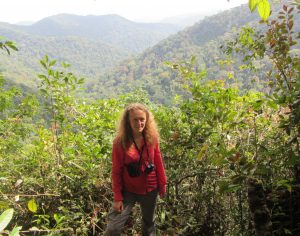
Juliet developed a passion for primates, particularly great apes, as a teenager. As a continuation of her interest in protecting these animals, her career now focuses on understanding the dynamics of the wildmeat trade, which poses a significant threat to primates. For Juliet, it is important to study the social side of things as well as the ecological perspectives, and to understand the interactions between the two. This is the reason she pursued a degree in human geography initially, rather than going straight down the zoology path. After gaining experience working with wild primates and those in sanctuaries, Juliet shifted focus to understand the livelihoods of hunters in Cameroon and Equatorial Guinea. However, acknowledging the need to address large-scale urban demand for wildmeat, she moved away from the forest, and now works in Kinshasa in the Democratic Republic of Congo where she is mapping the protein landscape of the city, and how wildmeat contributes to it. This involves analysing demographic factors in relation to wildmeat consumption, the results of which will feed into the delivery of demand reduction campaigns. Her experiences have brought Juliet to reflect on the importance of people with different skillsets coming together. Ecological evidence is necessary to build up a case, but it is sometimes not enough to reach the public in an effective way. Multidisciplinary work can bring innovative solutions to conservation issues.
Amy Molotoks
Postdoctoral researcher at the Stockholm Environmental Institute at the University of York

Her work focuses on the use of geographical information systems to spatially map out the trade-offs between biodiversity and environmental indicators such as carbon storage and agricultural production. She is also increasingly interested in the interactions between humans and the natural word. Amy enjoys being challenged, and really loves the problem-solving aspect of her job – especially as, in scientific research, there is always something new to learn.
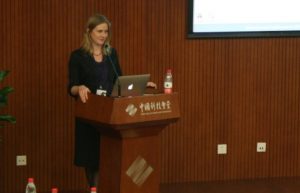
She spent a number of years facilitating UN processes and advising governments on spatial planning and safeguards, with a clear idea in mind that until key economic players align with the sustainability agenda, we will not be able to reverse the rapid degradation of nature and life support systems of the earth. Lisen loves working with people from different backgrounds and diverse skillsets, to collectively try to make the strongest possible contribution to accelerating the change we need to see in the world to avoid further ecological and social issues.
Elena Antoni
Policy consultant and project manager in international environment, trade governance and policy-making, attached to the UN Environment Programme

Elena has always been interested in politics, law and economics – and especially on how international trade and investment law interact with social development and the environment. What she loves most about her work, is trying to make sense of the relationships between governance, society, economy, nature – amongst other factors – with the overall goal of contributing to better solutions. She also enjoys the variety of tasks that are part of her work: from small research assignments, to writing policy recommendations, or simply a blog post, to designing an online course, giving a lecture, organizing a conference – and these are only few of the things that are part of her day-to-day work.
Katharine Abernethy
Professor in Ecology at the University of Stirling and Associate Researcher at the National Scientific Research Centre in Gabon

Growing up in the UK countryside, she became interested in ecology and zoology at an early age, and never really considered doing an indoor career. After studying and working in Scotland, she moved to Africa with her now husband in 1994. Since then, Katharine has been conducting ecological field research in Gabon, based at the SEGC field station in Lopé National Park – one of the most important ecological research sites in Central Africa.
Sonya Dyah Kusumadewi
Early career researcher in the Value Chains, Finance and Investment team at CIFOR
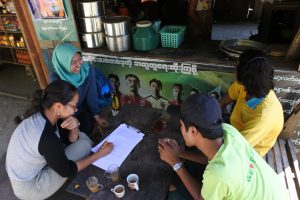
She started her studies in forestry by chance, but she soon started to love the subject. This love grew even more when, as part of her undergraduate studies, she worked as an intern in the logging concession area in the middle of Borneo’s rainforest and she got the chance to experience first-hand the beauty of the forest. Importantly, she got to experience the various social and environmental problems that occur within the forest. Such experiences increased her passion for forestry and her drive to learn more about the complexity of forest management. At CIFOR, Sonya’s research focuses on the forestry industry and its products, as well as other commodities indirectly related to forestry landscapes such as palm oil. What she finds most enjoyable about her work is the ability to travel for data collection, and meeting people with different skillsets.
Sophie Pambo Badjina and Margeorie Babicka Maroga
Research Assistants at IRET
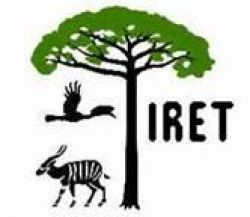
Sophie loves discovering new things about the environment, exchanging knowledge with people on the ground, learning about their culture and adapting to their lifestyles. Similarly, for Margeorie, working with communities is the part of the job she enjoys the most. This allows her to discover new languages, beliefs, practices and customs. They also agree that the days they both spend working with communities, and the knowledge they exchange, further enriches their professional experiences, as well as everyday lives.
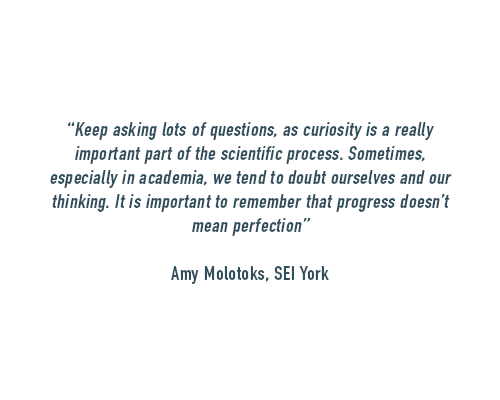
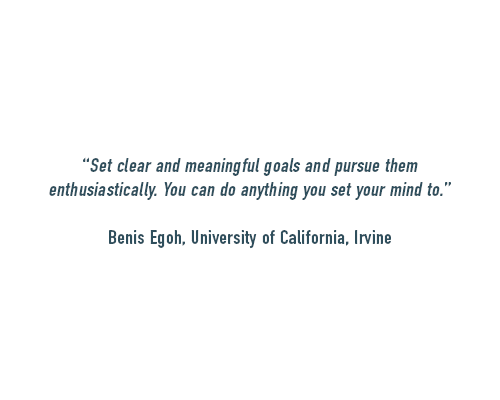
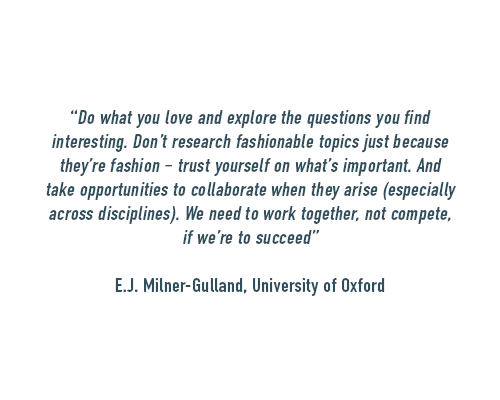
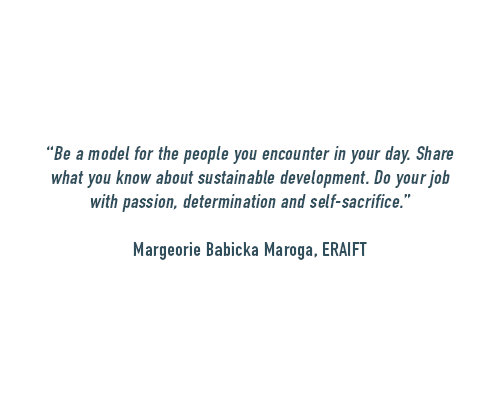
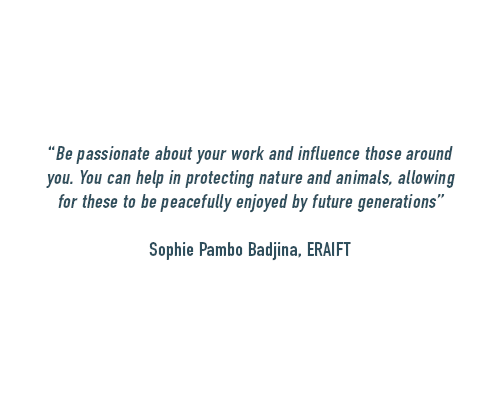
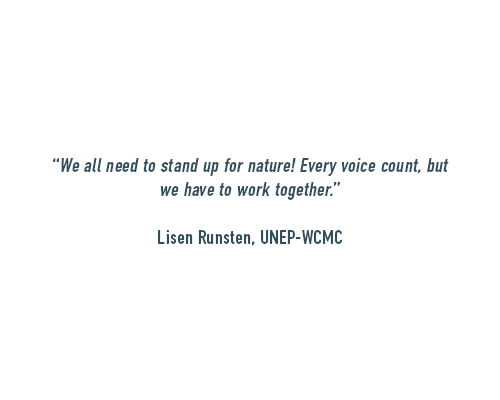
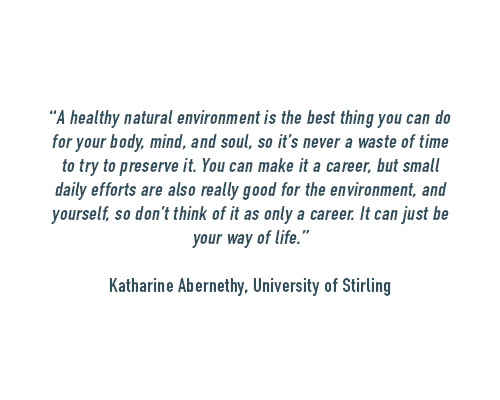
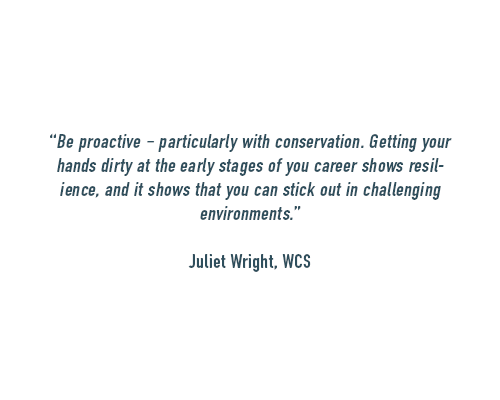
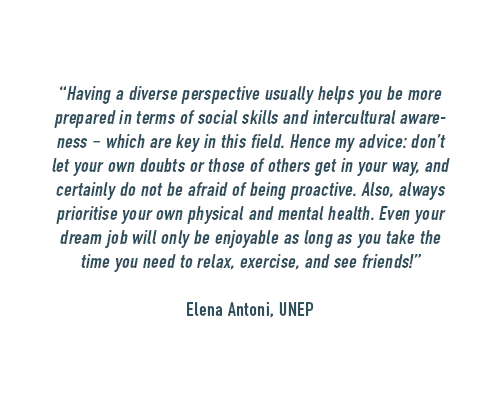
It was a great pleasure listening to what all these researchers had to say. It is also a good reminder of the breadth of the TRADE Hub project, and how diverse disciplines coming to work together can result in innovative insights for research, and ultimately greater impact.
To hear more about the work these women conduct, together with the rest of the TRADE Hub, sign up to our newsletter.
